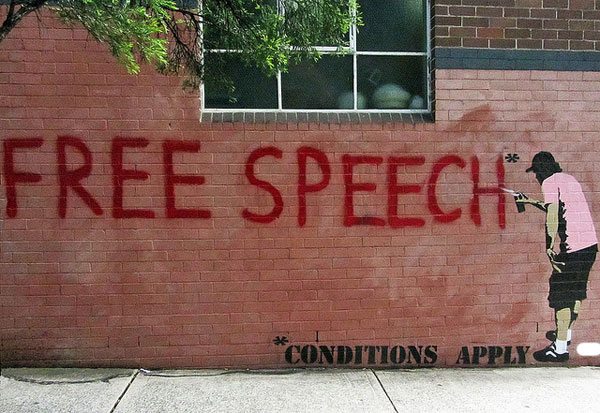
November 14, 2017; Bloomberg
It’s unusual to see one particular issue—free speech—appearing in so many cases in this year’s session of the Supreme Court of the United States (SCOTUS). Six out of 44, to be exact, which has caused dedicated SCOTUS watchers to take notice. Given the conservative leaning of this court, can we expect new interpretations that will have an impact on civil and human rights?
When it comes to free speech, legal experts do not seem to be of one mind on where this court is.
“The current court interprets the First Amendment more expansively in many ways than it did in the past,” said Rebecca Tushnet, an expert on the First Amendment who teaches at Harvard Law School. Although First Amendment claims have long had more “charisma” than other constitutional claims, “the gap may be getting even bigger,” she said. “When it comes to free speech, pretty much everybody is an activist,” said David Strauss, a constitutional law professor at the University of Chicago Law School.
Not everyone sees the Roberts court as pushing the free speech clause beyond its established boundaries. Eugene Volokh, a First Amendment scholar at UCLA School of Law, says the latest issues are mostly variations on topics the justices have been debating for decades. “I’ve heard the argument that somehow the First Amendment is straying into new areas,” Volokh said. “I just don’t see evidence for it, certainly not in this term’s cases.”
NPQ’s Martin Levine recently wrote about two other free speech cases in June 2017’s “Free Speech Just Got Freer.”
“In one case, the Court told the U.S. Patent and Trademark Office it could not deny trademark status to names it deems to be offensive. The specific case concerned an Asian American rock band that had unsuccessfully tried to protect its name, The Slants. In the ruling, Justice Alito wrote on behalf of a unanimous court that the law, even though it was applied evenhandedly, “violates the Free Speech Clause of the First Amendment. It offends a bedrock First Amendment principle: Speech may not be banned on the ground that it expresses ideas that offend.”
Sign up for our free newsletters
Subscribe to NPQ's newsletters to have our top stories delivered directly to your inbox.
By signing up, you agree to our privacy policy and terms of use, and to receive messages from NPQ and our partners.
The second case struck down a North Carolina statute that prohibited convicted sex offenders from accessing the Internet and social media. The specific case before the court asked whether a convicted sex offender could be arrested after he posted a message praising God on Facebook. Justice Kennedy’s majority opinion recognized how critical social media has become for expression and communication, and therefore it must receive First Amendment protections.
By prohibiting sex offenders from using those websites, North Carolina with one broad stroke bars access to what for many are the principal sources for knowing current events, checking ads for employment, speaking and listening in the modern public square, and otherwise exploring the vast realms of human thought and knowledge.”
Of the six free-speech-related cases in this SCOTUS term, perhaps the closest attention has been paid to the “wedding cake case” heard this week. In writing about the proceedings in SCOTUSblog, the analysis indicated the outcome could go either way, and that the final decision may lean on the position of Justice Anthony Kennedy, who is often the swing vote. SCOTUSblog summarized some of the proceedings:
The dispute…dates back to 2012, when Charlie Craig and David Mullins went to Masterpiece Cakeshop, a Denver-area bakery, to order a special cake to celebrate their upcoming marriage. But Jack Phillips, the owner of the bakery, refused to make them a cake. Phillips, who describes himself as a “cake artist,” is also a Christian who closes his business on Sundays and refuses to design custom cakes that conflict with his religious beliefs—for example, cakes that contain alcohol, have Halloween themes or celebrate a divorce or same-sex marriage
But many of the more liberal justices’ questions seemed to focus on trying to convince their more conservative colleagues that, even if they might be inclined to vote for Masterpiece, it would be next to impossible to write a ruling for the baker that did not, as Justice Stephen Breyer put it, “undermine every civil rights law since year 2.”
Other free speech cases on the SCOTUS docket include:
- A challenge to the requirement in some states that public-sector workers pay for the cost of union representation. This could prove a critical factor in who speaks for workers and for the financial stability of unions.
- A challenge to a California law that requires licensed pregnancy clinics to tell patients that they can call a county health department to learn about state-funded prenatal, family planning and abortion services. This could also harken to the requirements for abortion clinics to perform ultrasounds and inform patients that fetuses can feel pain.
- A Minnesota case to consider guaranteeing the right of people to wear political apparel (t-shirts and buttons) when they go to vote.
- A man who says he was arrested in retaliation for suing and politically criticizing his local government.
- Free speech also plays a central role in what could be a watershed case involving partisan voting districts. The court’s liberals could join with Justice Kennedy to allow legal challenges to partisan gerrymandering for the first time. During arguments in October, Kennedy suggested those challenges would be based on the First Amendment’s protections for speech and free association.
As you look at these cases and ponder the possible outcomes and the ramifications for work of nonprofits, the importance of the courts and who makes these decisions becomes a factor in the work of the sector.—Carole Levine












